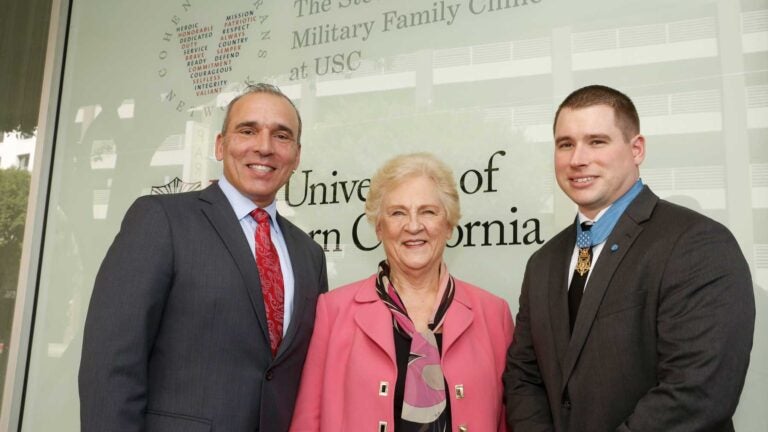
Anthony Hassan, Marilyn L. Flynn and Kyle White at the opening of the Steven A. Cohen Military Family Clinic (Photo/Steve Cohn)
USC mental health clinic’s opening celebrates vision for veterans
The Steven A. Cohen Military Family Clinic offers free care to vets and families dealing with PTSD and other issues
The grand opening of the Steven A. Cohen Military Family Clinic at USC celebrated a vision aimed at bringing the highest quality of mental health care to Los Angeles’ veterans and military families.
The downtown Los Angeles clinic was made possible by a $15.7 million grant from Cohen through his nonprofit Cohen Veterans Network. It offers free care to veterans and their families who are suffering from post-traumatic stress, mood disorders, substance abuse and other mental health issues.
Marvin Southard, clinic CEO and professor of practice at the USC Suzanne Dworak-Peck School of Social Work, said the clinic was going to do more than provide mental health therapy. Through a robust outreach staff, it hopes to connect veterans to other services and benefits they might need in the region.
“The biggest part of our vision for the clinic is that we desire not merely to be another provider of care, we want to be the connective tissue that allows all of us who serve veterans to do so well,” Southard said.
“We don’t want to supplant or compete. We want to be the support system in our region. If we accomplish that, the people will flourish.”
The clinic marks the latest investment by USC in the well-being of service members, veterans and military families. The USC Suzanne Dworak-Peck School of Social Work was the first private, research institution to create a program aimed at training the next generation of behavioral practitioners in the unique challenges faced by military populations.
The school also launched the Center for Innovation and Research on Veterans & Military Families, which has conducted several studies on the transition challenges facing veterans. Four years ago, the USC Marshall School of Business launched the Master of Business for Veterans program, and two years ago, the university opened a veterans resource center for student veterans.
“The highest form of gratitude is not to utter words, but to live by them,” said USC President C. L. Max Nikias. “By opening our clinic, we live by our vow to better the lives of those who have preserved our liberty here and abroad.”
What sets it apart
Marilyn L. Flynn, dean of the school of social work at USC, said what made the clinic so unique was also what would set it apart as a premier resource in the region.
“The clinic includes an especially wide and powerful collaboration between nurse practitioners, psychiatry and the community as partners. Often the community is left off that list. In Los Angeles, that’s essential,” said Flynn of the partnership between the school and the Department of Psychiatry and Behavioral Sciences at the Keck School of Medicine of USC.
The Los Angeles clinic is the fourth to open within the Cohen Veterans Network, and the first on the West Coast. Among the new clinics that opened this year, more than 500 veterans and family members have been seen in Los Angeles, Dallas, Philadelphia and San Antonio.
I don’t know what my life would look like if I didn’t get help.
Kyle White
“These numbers speak unfortunately to the demand, and fortunately to the fact that we’re able to meet that demand,” said Anthony Hassan, CEO and president of the Cohen Veterans Network.
Part of the clinic’s mission is to destigmatize mental health care among this population.
Kyle White, an Army veteran who received the U.S. Congressional Medal of Honor for his efforts in Afghanistan, said he realized years ago while still in the military that he needed to get help and was grateful that he did.
“I don’t know what my life would look like if I didn’t get help,” White said. “It’s time to stop looking at statistics. It’s time to destigmatize the idea that because our wounds are invisible, they’re somehow less than a physical one.”
